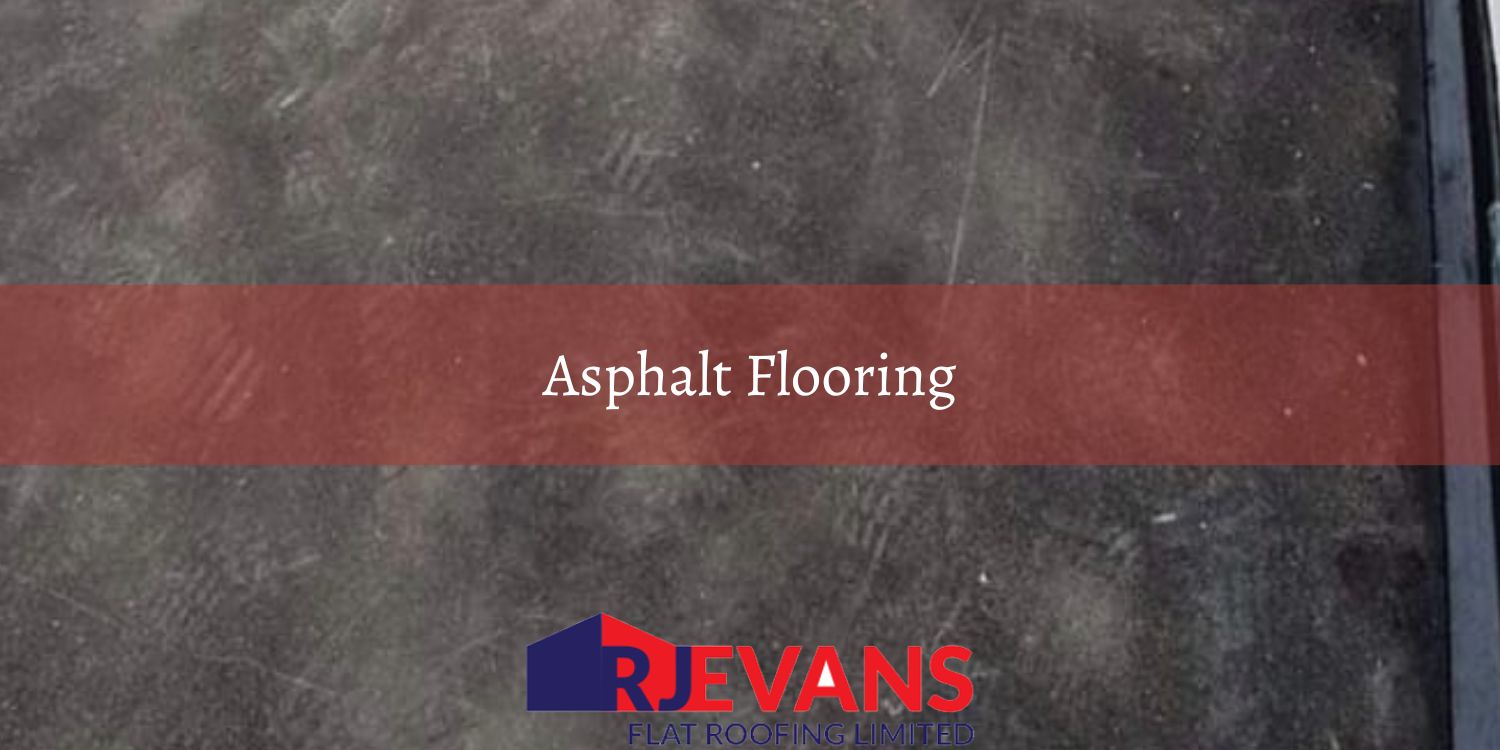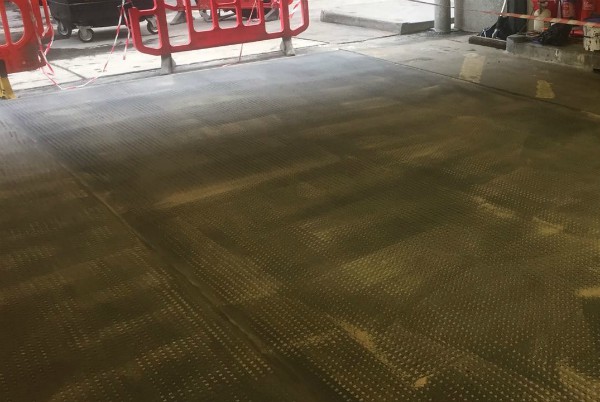I agree Our site saves small pieces of text information (cookies) on your device in order to deliver better content and for statistical purposes. You can disable the usage of cookies by changing the settings of your browser. By browsing our website without changing the browser settings you grant us permission to store that information on your device.

Mastic asphalt flooring is a type of flooring material which is known for being durable, having excellent waterproof qualities, and the versatility to coat a number of substrates. It is made from a mixture of suitably graded aggregates and asphaltic cement. The asphaltic cement usually consists of bitumen, which acts as a binder, mixed with fine aggregates like limestone or sand. This combination gives the material its unique properties. It is typically laid hot. During application, it is heated to a molten state and spread in layers. Once cooled, it solidifies to form a hard, smooth surface.
Mastic asphalt flooring is highly durable, resistant to water, and provides an effective damp-proof membrane. It's also relatively flexible compared to other hard flooring types, which helps in resisting cracking. It is often used in areas which require a durable and waterproof surface. This includes; industrial floors, car parks, and basements. It's also used for flat roofs and foundations due to its waterproof nature. The main advantages of mastic asphalt flooring are its longevity, resistance to dampness and water, low maintenance requirements, and the ability to withstand heavy traffic. Professional installation is required due to the need for heating and laying the material correctly. Maintenance is typically low, with regular cleaning usually being sufficient to maintain its appearance and functionality. Mastic asphalt flooring is a practical choice for industrial and commercial applications where durability and water resistance are critical considerations.

Asphalt flooring is a durable and versatile surfacing material made from a mixture of bitumen (a sticky, black, and highly viscous liquid or semi-solid form of petroleum) combined with mineral aggregate (such as sand, gravel, or crushed stone). This type of flooring has been traditionally used in both industrial and residential settings due to its resilience, water-resistant properties, and ease of maintenance. The bitumen acts as a binder, holding the aggregate together and creating a tough, hard-wearing surface that can withstand heavy foot traffic and resist moisture penetration.
Asphalt flooring is known for its sound-dampening qualities, making it a popular choice for schools, hospitals, and commercial buildings where noise reduction is beneficial. Its installation process typically involves heating the asphalt to make it malleable, then spreading it over the prepared subfloor and allowing it to cool and harden. This flooring option is cost-effective, offering a long lifespan with minimal upkeep required, aside from regular cleaning and occasional sealing to maintain its appearance and performance. Additionally, asphalt flooring can be made slip-resistant with the incorporation of certain finishes and textures, enhancing safety in high-traffic or wet areas. Its versatility in application and the ability to be laid in various thicknesses make it suitable for a wide range of environments, from warehouses and garages to playgrounds and driveways.
An asphalt floor can last longer and outperform almost every other flooring material on the market. There reasons for the longevity of this flooring system are:
Unsurprisingly all these factors make asphalt flooring a material of choice for specifiers.
You can see mastic asphalt flooring used in a number applications including in warehouse floors, school classrooms and government housing walkways.
When it comes to the installation of mastic asphalt flooring, this process can be completed extremely quickly using what is known as a hot charge process. When the molten asphalt is laid upon the substrate it cools off very fast. This means within a few hours of an installation, carpets and other items of furniture can be put back into place. The obvious benefit to this is any installation causes hardly any disruption.
Asphalt flooring stands out as an exceptionally versatile and durable option for both commercial and industrial settings, offering a myriad of benefits that extend beyond its fundamental function as a flooring material. Its unparalleled durability, combined with moisture-resisting capabilities and low maintenance requirements, positions it as a top choice for areas subjected to high traffic and environmental stress. This comprehensive overview highlights the most significant advantages of choosing asphalt flooring, underscoring its effectiveness, cost-efficiency, and sustainability as key factors that contribute to its widespread adoption and long-standing reputation in the construction industry.
Asphalt flooring's resilience against the forces of wear and tear solidifies its status as an ideal choice for bustling spaces. Its robust composition allows it to endure the relentless movement of people and machinery, safeguarding its structural integrity and appearance for years, even in environments subjected to extreme conditions.
The impermeability of asphalt flooring to water ensures comprehensive protection for underlying structures. This capability is critical in preventing the percolation of moisture, which can lead to severe structural issues such as rot, mold, and the corrosion of metal reinforcements, thereby preserving the building's foundation and interior spaces from water-induced deterioration.
Asphalt flooring's robustness is particularly advantageous in commercial and industrial settings where it faces incessant foot and equipment traffic. Its capacity to maintain structural integrity and aesthetic appeal under such conditions makes it an unparalleled flooring solution for such demanding environments.
The durability and low upkeep of asphalt flooring translate into significant long-term cost savings. Its longevity reduces the frequency of needed repairs or replacements, offering an economical flooring solution when considering the full lifecycle costs associated with flooring materials.
Decades of reliable performance have established asphalt flooring as a dependable waterproofer. Its track record of providing effective moisture barriers in a variety of settings reinforces its status as a proven solution for waterproofing needs, ensuring peace of mind for property owners and managers.
Incorporating aggregates into the asphalt mix not only increases its resistance to wear but also enhances safety by providing a non-slip surface. This adaptability allows for the customization of the flooring to meet specific safety and durability requirements, making it suitable for a wide range of applications.
The simplicity with which asphalt flooring can be repaired minimizes downtime and disruption. Damaged areas can be quickly addressed without extensive procedures, ensuring that the flooring remains functional and aesthetically pleasing with minimal effort.
Asphalt flooring's production process, achieving a carbon zero rating, reflects a strong commitment to reducing environmental impact. This designation highlights the material's alignment with sustainable building practices, contributing positively to the construction industry's environmental goals.
Utilizing recycled materials in asphalt flooring not only enhances its environmental friendliness but also supports sustainability efforts within the industry. This practice reduces waste and the demand for new resources, reinforcing asphalt flooring's role in fostering eco-conscious construction.
Its capacity to absorb sound makes asphalt flooring an ideal choice for environments where reducing noise pollution is a priority. This quality is particularly valued in multi-level buildings, educational institutions, and healthcare facilities, where minimizing sound transmission can create more comfortable and conducive spaces.
Asphalt flooring contributes to a building's thermal efficiency by providing natural insulation. This property helps in maintaining consistent indoor temperatures, reducing the need for heating and cooling, and thereby lowering energy costs and enhancing occupant comfort.
The resistance of asphalt flooring to chemicals ensures it remains undamaged in the event of spills. This feature is indispensable in industrial settings, where the flooring is often exposed to harsh substances, safeguarding it from degradation and maintaining a safe working environment.
The wide array of colors and patterns available for asphalt flooring offers architects and designers the flexibility to create customized looks. This versatility allows for seamless integration into various design themes, ensuring that functional flooring solutions do not compromise the overall aesthetic of a space.
Asphalt flooring's capacity for achieving an attractive finish ensures that it can meet both practical and stylistic requirements. Its visual appeal can enhance the ambiance of a space, proving that choosing a durable flooring material does not require sacrificing style.
The installation process of asphalt flooring is designed to minimize disruption, allowing for continued operation and use of the space. This efficiency is crucial in limiting the impact on daily activities, making it a considerate option for busy commercial and public environments.
Mastic asphalt is a carbon zero rated waterproofing material which is made up of limestone aggregates bound together with bitumen. This bitumen can either be standard bitumen, standard bitumen combined with Lake Asphalt or a hybrid modified bitumen. Although this waterproofer is most famous for mastic asphalt roofing, it is also excellent for the waterproofing of other applications including floors, steps, balconies and car parks. When it comes to the laying of mastic asphalt it must be heated until it becomes a molten liquid. Then it can be laid with the use of a wooden float or a spatula.
To lay a mastic asphalt floor in a building the substrate must be cleaned and primed. Next a layer of sheathing felt or staple tissue will be laid to allow movement between the substrate and the asphalt flooring which will be laid. On top of the sheathing felt or staple tissue 1 or 2 layers of flooring grade asphalt should be laid to a nominal thickness of between 20-25mm. For certain applications, the thickness of the asphalt may be increased such as railways platforms, loading sheds, and heavily used factory floors. This asphalt will serve as a damp proof membrane.
• We have our own asphalt mixer which means a flame-free laying of the mastic asphalt. Better consistency in the asphalt mixture meaning a more efficient installation process with a better overall finish.
• At RJ Evans we have a vastly experienced team. We have operatives with more than 40 years’ experience.
• We provide a range of FREE quotations and solutions for all projects.
• Insurance Backed Guarantees.
• Excellent Customer Support throughout project.
• Rated 5 out of 5 from our previous customers.
If you would like a quotation or any information on asphalt flooring please get in touch with us or call us now on 01277 375 511.
.
